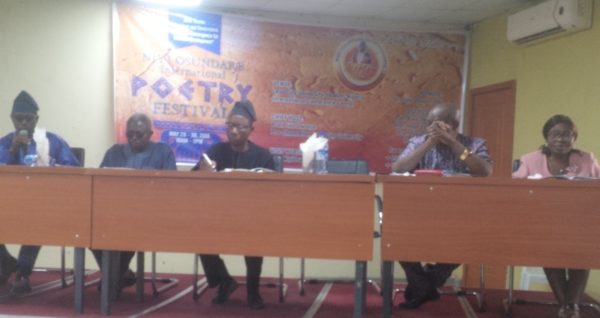
DAY ONE
Two days after I saw the festival flyer, I found myself at the venue—Lead City University, Ibadan. I am a fan of Niyi Osundare’s. I have read some of his works—including his valedictory lecture The Universe in the University and his monograph The Writer as Righter—and watched him speak on many occasions.
This was the first time the festival was hosted in Lead City since its inception four years ago. The serene campus seemed the perfect choice. Inside one of the halls in the International Conference Centre, some of the guests were already seated. Others were outside for their registration. In this sea of faces, I was only familiar with two—my former neighbour, a second-year student of English at the University of Ibadan, and the chairman of the occasion, Professor Emeritus Ayo Banjo.
Among the addresses, the one that struck me most was that of the Lead City Vice Chancellor, Professor Aderemi Aeyemo. He said Osundare is the next likely Nobel Laureate from Nigeria and a leading voice of the voiceless. Afterwards, the keynote speaker, Dr Tunji Olaopa, mounted the podium, lecturing us on the relevance of literature to governance. Olaopa is a political scientist and a public-sector management expert, but he delivered his lecture, titled “Literature and Governance: Finding a Convergence for National Development,” as though he were a don of literature.
“I share Prof. Osundare’s commitment to Nigeria,” Olaopa said. “When he writes, Nigeria looms large in his memory. And that gives a strident voice to his verses which bristle with indignation and fiery assertions about what is right, what is wrong, where we are, where we were, where we should be.”
Olaopa’s lecture was divided into six parts: “Introduction: The Poet as Prophet”; “Literature and Governance Nexus”; “Literature and Politics”; “Nigeria and the Governance Crisis”; “Osundare’s Patriotic Poetry”; and “Conclusion: Rethinking Poetry.” Citing three of Osundare’s poems, “Invocations of the Word,” “No Hiding Place for Politicians,” and “My Lord, Tell Me Where to Keep Your Bride,” Olaopa painted a picture of the sham Nigerian governance system. He stressed that Osundare has identified himself as the “poet of the people,” and that this has connected him to the governance woes that has impoverished Nigerians.
Osundare was next on the podium after Olaopa’s lecture. He said that he is what he is today because he stood on the shoulders of giants. And then he expressed concerns over the dysfunctional state of Nigeria’s affairs. “How can we live in the ocean and wash our hands with saliva?” he asked. On the other hand, he was optimistic that positive changes will come and transform Nigeria for good. “Nigeria may be sleeping, but it is not dead. This country will not change until we change it.”
Osundare’s remarks ended just in time for the tea break. We took tea and snacks. We also used the break to reflect and discuss the lecture. It was also a time for chitchat, to know what who is writing, what who has published, and where.
After the tea break came the panel discussions: patriotism in Osundare’s poetry, hope in Osundare’s poetry, politics in Osundare’s poetry, and Osundare and the past. On patriotism in Osundare’s poetry, Toyin Jegede said, “Osundare is not ashamed of anything that is his own.” On hope in Osundare’s poetry, Joe Ushie said, “Osundare’s poetry portrays regeneration and revivalism.” On politics and Osundare’s poetry, Banjo Okunade said, “His narrative prowess and literary inventions in politics and governance have a greater reach in the society.” On Osundare and the past, Osoba Gabriel said, “Osundare is connected with the past, but with the good part of the past.”
Lunch was next after the panels. Then came poetry reading, drumming, and dance. Mathew Umukoro read a poem, “Ordeals of the Famous Wordsmith.” Akim Lasisi and his crew gave a musical rendition of a poem, “Homage.” Ebika Anthony read two poems, “An Oriental Love” and “One Word.” Soji Gbelekale did a Yoruba oral performance.
DAY TWO
On my way to the Festival’s second day, I stood in a crowded public bus, sweating, thinking of the poem I would compose and read during the poetry session. Fortunately, I came up with one.
When I got to the festival venue, I could see some people writing or revising their piece. Outside the conference hall, publishers and booksellers displayed colourful books. I overheard a man saying that Dumebi Ezar Ehigiator has used her two novels The Spider’s Web and Wrecked to turn herself into a known feminist like Chimamanda Ngozi Adichie. Feminist literature fascinates me. Just as I was about to settle in and enjoy the discussion, the MC announced the kick-off of the programme, and we all went inside.
At about 9:30 a.m., the poetry reading and art performance began. Nasir El-amin read two poems “My Mission to Kala” and “This House Has Fallen.” Sophia-Kathrine Haruna read short travelogues “Series on the Highway.” Siyanbola Elizabeth read two poems, “The Consequences of Ignorance” and “Misidentification.” And Adebayo Adegbite read a short story, “Tortoise and Monkey.” Lawal Samuel read two poems, “The Composition” and “The Irony of the White House.” Agih Christopher read a poem, “We Have Lost A Home in the Tide of Time.” Olubunmi Familoni read a poetic short story “Purple.” And I read a poem, “Lovers are Blind People,” unsurprised that it was the shortest piece in that session.
I met Osundare later, and he told me, “You read the shortest poem in the world,” and we laughed. It was an honour for an international award-winning poet to comment on my poem, short or long.
After the tea break, the next session was “Niyi Osundare Interacts with Secondary School Students.” From this session, I understood what one of the discussants on Day One meant by: “Osundare knows how to use words. He makes you look at an old story with a new eye.”
“Subjects for poetry are there, everywhere,” Osundare told the students. He went on to give an analogy: “When you see hungry people, you sympathise with them and try to do something that would demean hunger in our land.”
“Why is it that your poems are about politicians?” one of the students asked. Osundare laughed and told them that not all his poems are about politics or politicians. Still, he stressed that politics is important. He then asked the students if they are happy with the way Nigeria is today, and they all said no. “A lot of work has to be done. Some people do it with the gun. I have no gun,” Osundare said. “But words are powerful. We can change the world through literature.” He went on to buttress the power of literature: “Why are we still reading Shakespeare? Why do we read the Bible and the Koran? These are things that keep giving us the sense of ourselves as human beings.”
After Osundare’s interaction with the students, a short film, Without Money, was shown. At 2 p.m. came lunch, the last lunch of the festival, whose taste still lingers till today. Then students of Performing Arts, Lead City, did some poetry and drama performance. At 4:30 p.m., the closing ceremony was held and the festival came to a close.
About the Writer:
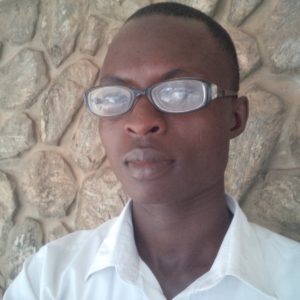 Kingsley Alumona is a geologist and reporter from Delta State, Nigeria. He works at the Nigeria Tribune. His works have appeared in Kalahari Review, TUCK magazine, Daily Trust, Nigerian Tribune, The Nation, The Independent, The Vanguard and The Sun newspapers. You can reach him on Twitter: @kingalumona.
Kingsley Alumona is a geologist and reporter from Delta State, Nigeria. He works at the Nigeria Tribune. His works have appeared in Kalahari Review, TUCK magazine, Daily Trust, Nigerian Tribune, The Nation, The Independent, The Vanguard and The Sun newspapers. You can reach him on Twitter: @kingalumona.


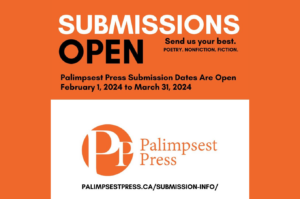


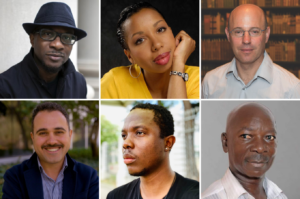
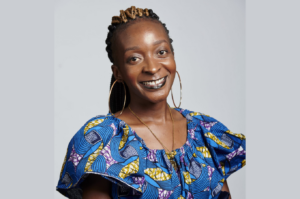
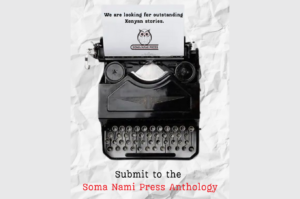

Niyi Osundare International Poetry Festival 2019 for July. May 13, 2019 08:24
[…] The Niyi Osundare Poetry Festival was set up in 2015 to celebrate both poetry and Osundare one of the most recognised names on the continent where poetry is concerned. Since then Nigerians have seen the best in poetry and other literary forms in the years that followed of 2016, 2017, and last year. […]